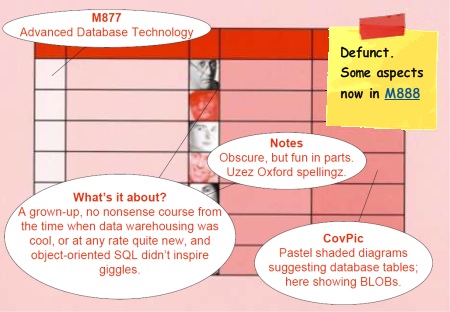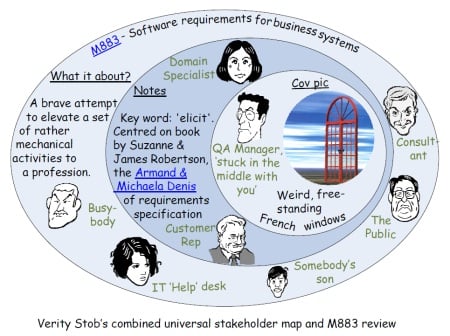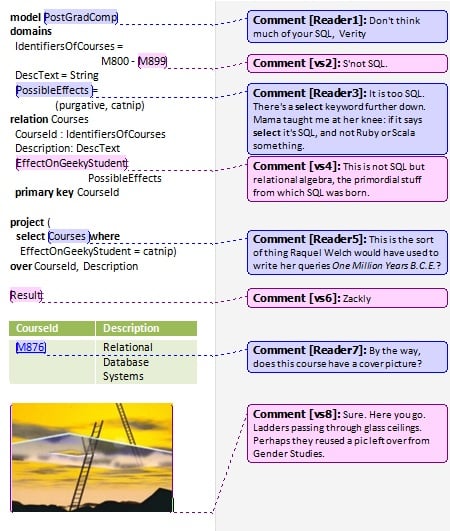This article is more than 1 year old
Educating Verity the OU way
'The skin of my C++ custard remained unruffled'
The text
When choosing an OU module, prefer those with real printed textbooks over those which just offer web pages and PDFs. I have in-depth justification for this Luddite attitude:
- The best place and time to do undisturbed OU reading is: any short period of otherwise useless free time, for example while sitting in the park, chewing your lunchtime sarnie, stoically enduring the drizzle. Now, are you really going to expose the spanking new iKindle 3.0, which in your case you do not have, to the hostile environment of a wet Wednesday Wouldbemugged Green?
- In order for them to be absorbed, OU texts need to be annotated with Post-its and marginal scribbles and highlighter daubs containing remarks such as "Oh yeah" and "Sez who?". This only really works if you are actively vandalising a proper book.
- You need to start the course by printing out the errata from the OU website and sticking them into the books with little bits of sticky tape. (See next bit for justification.)

CASE STUDY: Subversion subversion
As a student, be sure to take note of the errors in the text, both pre-supplied errata and those you may discover yourself. They are important. Not for the mistakes themselves, which are usually trivial, but because of the implied meta-data. A mistake can hint that the authors and reviewers weren't much interested in the material, which means, in the context of the course, you probably shouldn't be either.
An example. Figure 11.7 of M882 (again) is a moderately complex schematic of the VCS Subversion. A pain to memorise. Yet on the very next page of text, there is prehistoric advice on storing details of code changes in header comments, and how to use a Perl script and regexs to build these into a change history.
The astute student will conclude that the course writers were unaware that Subversion (or any VCS) can trivially give you a change history for the asking, without any 1980s-style grepping through headers. Hence time spent mastering Subversion's architecture will not result in M882 gains any more than, say, watching Top Gear repeats on Dave. They aren't going to test you on subjects they don't themselves grasp.
It is by such observation, combined with other frowned-upon gambits such as analysis of past papers, that one can pass handsomely without letting the OU study become a hopeless time sink.

Certain characteristics of OU texts can be quite amusing. Their pompous vocabulary goes beyond even the requirements of academia. For example, they freely employ the word pedagogical, apparently not realising that its use is reserved to those strange and seedy schoolmasters who appear in early Evelyn Waugh and Aldous Huxley novels.
Another peculiarity: every few paragraphs they put in an SAQ – a Self Assessment Question – so that you can test yourself on what you have just read. Fair enough. But, excepting those occasions when I already happened to know the correct answer due to prior knowledge, I could hardly ever answer these. There simply hadn't been enough information, or rather, they expect you to deduce too much from too little.
CASE STUDY: O-level physics with Nuffield
During my O-level years, an organisation called Nuffield used to teach physics in a quixotic way: by first providing a picture of an apple tree, then letting us observe a short black-and-white film of the descent of an unsupported fruit, and finally inviting us kids to infer the existence of an inverse square law. Or something not far short of this.
It was as though they didn't take the reported intellect of Sir Isaac and chums seriously, and supposed every infant to be independently capable of digesting the implications of a falling Cox's Orange Pippin. They forgot that acquired knowledge looks much smaller in the rear view mirror than it does on the approach.
The OU is also a child of the 1960s and 1970s, and I think it is time it shook this habit.
EMPIRICAL HEURISTIC OBSERVATION
Don't fret if you struggle with OU SAQs.
They are only for students who already know the answer.

